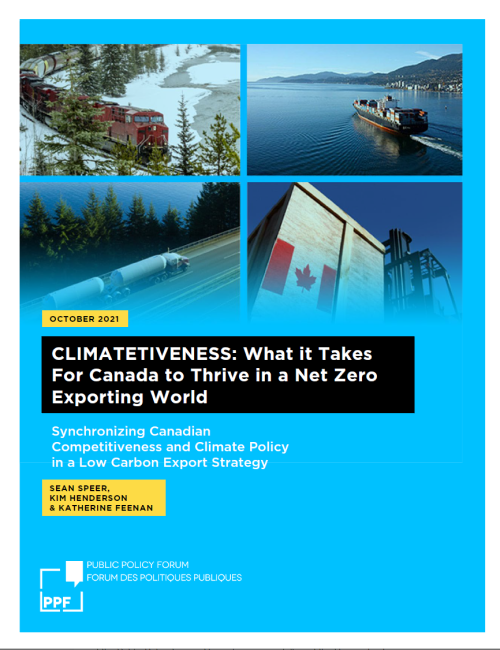
Climatetiveness
What it takes for Canada to thrive in a net zero exporting worldIn addition to being the year-and-a-half when a pandemic shook the world, 2020-21 will be remembered for a renewed determination to address long-neglected areas of policy. The COVID-19 crisis not only threw brand new challenges on the public agenda, but also reminded us of the need to get moving on pre-existing and evolving ones.
As the Public Policy Forum rolled up its sleeves in the Spring of 2020 on a project we called ReBuild Canada, we kept encountering vulnerabilities in long-standing trade policies — from export infrastructure to our heavy reliance on a less dependable United States and an increasingly bellicose China. Moreover, the juxtaposition of trade and climate change was producing an entirely new set of challenges. Carbon was emerging as a new factor of competitiveness, with serious ramifications for a nation like Canada that is both highly reliant on exports and serves as a resource storehouse for our trading partners.
Over the summer of 2020, the Business Council of British Columbia published a detailed paper about how the province’s exports generally contain lower carbon intensities than products they are competing against or displacing. We and the council felt more work was needed on a pan-Canadian basis to understand how Canada could take advantage of its low carbon exports (for our own good and the global good) and transition industries to become low carbon producers. If Canada was going to continue to be among the great exporting nations in a world in which carbon had joined cost in the competitiveness equation, a new approach to policy was required. Some of this had obviously been contemplated within Article 6 of the Paris Agreement. But Article 6 remained an orphaned section. We felt Canada should adopt it or something akin, into our family of policy interests.
And so, in the way of the Public Policy Forum, we gathered a variety of interested parties together to examine the issues at play. The timing seemed right to ensure that Article 6 would be on the agenda for Paris Agreement signatories at the so-called COP26 meeting scheduled for November 2021 in Glasgow, Scotland, along with other multilateral and bilateral measures to ensure that the national accounting systems for carbon did not inadvertently sideswipe trade of benefit to all. This report is the manifestation of that concern. It calls for Canada to be more purposeful in asserting our national interest and ensuring that interest is aligned with the greater global good.
I want to thank all the participants in this process, with a special shoutout for the authors of the report, PPF Fellow and former British Columbia cabinet secretary Kim Henderson, PPF Scotiabank Fellow in Strategic Competitiveness Sean Speer and PPF Senior Policy Lead Katie Feenan. They have organized and attended sessions with our partners and others in coming to the ahead-of-the-curve conclusions you will discover in this paper.
Edward Greenspon
President & CEO
Public Policy Forum

Synchronizing Canadian Competitiveness and Climate Policy in a Low Carbon Export Strategy
Download PDFWITH THANKS TO OUR PARTNERS









